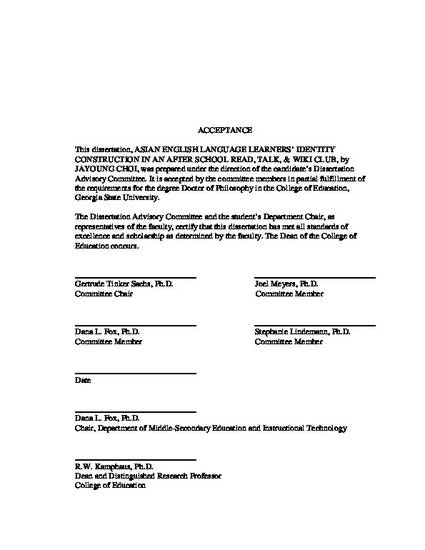
For English language learners (ELLs) who traverse two different sociocultural and linguistic worlds, identity construction is a particularly complicated process. However, examining learners’ identity construction is vital because language and literacy learning is mediated by learners’ identities (Gee, 2003). This investigation sought to address the dearth of studies on Asian ELLs in second language acquisition and literacy research which have been limited in part due to the model minority stereotype ascribed to Asian students (Ogbu, 1987).
Within the frameworks of collective identity theories (Gee, 2003; Weedon, 1987; 2004) and sociocultural learning theories (Bakhtin, 1968; 1981; Vygotsky, 1986), the purpose of the study, therefore, was to expand our understanding of Asian ELLs by examining how they construct their identities in an after school literacy club through reading and discussing multicultural literature. The research question was: How do Asian adolescent English language learners construct their identities in an out-of-school Read, Talk, & Wiki (RTW) club? Participants included four Asian ELL high school boys: one Korean, one Uzbek, and two Indians. Data sources included interviews, face to face club meetings, electronic Wiki postings, member checking, peer debriefing sessions, and a researcher journal. Data analyses followed the principles of the constant comparative method (Glaser & Strauss, 1965), and individual case as well as cross case analyses were conducted (Yin, 2003). Trustworthiness, dependability, and credibility were established through triangulation of data sources and the transparent audit trail (Lincoln & Guba, 1985).
The results revealed that the participants lived in separate home and school worlds. Participants also identified respect as an important Asian value that distinguished them from their American peers. In addition, although the participants capitalized on the positive model minority stereotype, they stressed the fallacy of using it to generalize to all Asians. The findings suggest that providing a safe literacy site where multicultural literature is used could be beneficial to ELLs. They also suggest that it is necessary to broaden our common understandings of Asian students and that educators need to recognize learners’ multiple identities through a variety of reading and writing activities.
Available at: http://works.bepress.com/jayoung-choi/18/
